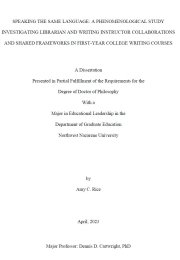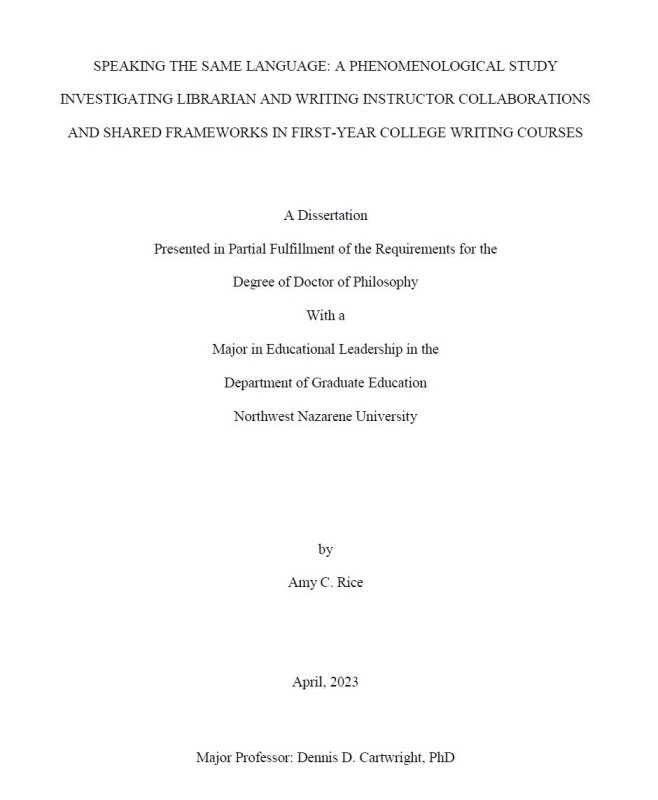- Resource Types
- Resource Languages
- Institutional Repository
 Visit the home page
Visit the home page
About Site Language
WHDL is viewable in multiple languages. Use the pull-down menu to select a language to view the site.
I changed my language, but I’m still seeing resources in the other languages?
If a resource or text has not been translated into your selected language, it will appear in the initially added language. We are always looking for help translating these resources. If you can help, contact us!
WHDL - 00018732


click to copy
Rice, A (n.d.). Speaking the same language: A phenomenological study investigating librarian and writing instructor collaborations and shared frameworks in first-year college writing courses .
Rice, AmySpeaking the same language: A phenomenological study investigating librarian and writing instructor collaborations and shared frameworks in first-year college writing courses . , n.d.
Rice, AmySpeaking the same language: A phenomenological study investigating librarian and writing instructor collaborations and shared frameworks in first-year college writing courses . , n.d.
Rice, AmySpeaking the same language: A phenomenological study investigating librarian and writing instructor collaborations and shared frameworks in first-year college writing courses . , n.d.
In this hermeneutic phenomenological study, the researcher interviewed librarians and
writing instructors to understand their lived experiences of teaching information literacy in first-year college writing courses. The researcher’s interest in the study was inspired by a rich collaborative relationship among the librarians and writing instructors at the
researcher’s institution. Although collaborations vary in depth, librarians and writing
instructors often collaborate to teach information literacy skills. However, a key challenge of collaboration is navigating disciplinary differences. Understanding complementary disciplinary frameworks can help facilitate better collaborations. The researcher and participants reviewed the ACRL Framework for Information Literacy for Higher Education, the WPA Framework for Success in Postsecondary Writing, and the WPA Outcomes Statement for First-Year Composition. Writing and information literacy skills and dispositions are among a host of factors that predict success and retention of first-year college students. Both information literacy and writing are complex skills to teach, and first-year students struggle to successfully synthesize sources into their writing. Study findings demonstrated a spectrum of collaborations between writing instructors and librarians: Emerging, Expected, and Expansive. Productive collaboration elements included buy-in and enthusiasm, communication, teacher preparation and experience, and focus on student engagement and learning. Counterproductive collaboration characteristics included lack of buy-in, discipline-related hindrances, communication issues, misunderstanding of each other’s role, and teaching inexperience. Although some institutions had structured programs for first-year writing that required writing instructors and librarians to collaborate, successful collaboration was more dependent on strong relationships between collaborators. Not all participants shared frameworks with each other, nor were all writing instructors familiar with the WPA Framework and Outcomes. However, when reviewing the frameworks during the study, many participants noted the potential of complementary
frameworks to help them improve collaboration. Participants demonstrated varying degrees of interaction through discourse communities and communities of practice. Implications of the study center around three primary areas: promoting collaborations as a positive aspect of the student experience, advocacy and support for collaborations and interdisciplinary conversations within the structure of a higher education institution, and advocacy for inclusion of instruction preparation in core library science courses and professional development around teaching after librarians enter the field.
This material is used by permission of the rightsholder in accordance with the terms of the relevant content release. As a user, you have permission to use this content and download a copy for non-commercial use only. Downloading multiple quantities of this resource is expressly forbidden.
155 Resources
1993
2017
2018